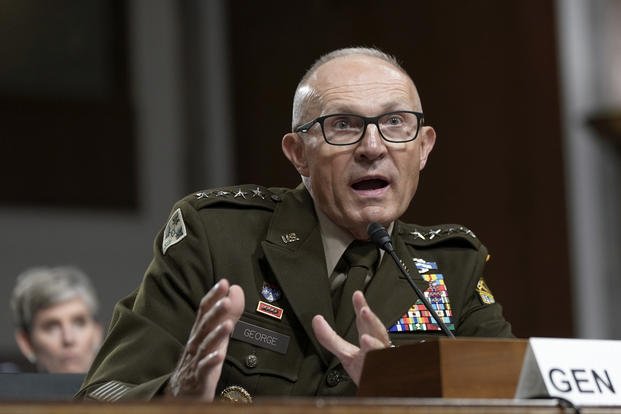Army’s Next Top Officer Wants Higher, Gender-Neutral Fitness Standards

The nominee for Army chief of staff told lawmakers Wednesday that he wants tougher and gender-neutral physical fitness standards, as the service and Congress remain locked in a years-long tug of war over how to measure athletic ability.
Gen. Randy George, an infantry officer, testified on fitness standards as part of his confirmation hearing before the Senate Armed Services Committee. He was tapped by President Joe Biden to replace retiring Gen. James McConville.
But his promotion could be delayed due to an Alabama Republican senator’s ongoing hold on confirmations of military officers — including service chiefs — in the chamber. George’s office declined a request for an interview ahead of his confirmation hearing.
Read Next: Iraq Vet Stole Humvee Before Smashing it into Building at Fort Stewart, Prosecutors Say
“When I first came in — I know by the time I was a lieutenant — the standards were a lot different, a lot higher, and that’s what we need to do,” George said when asked about gender-neutral fitness standards during his Senate confirmation hearing.
“We would like to take the time to make sure we’re doing this appropriately and have [standards] set the right way,” he added, agreeing with a question from Sen. Tom Cotton, R-Ark., that measurements of fitness, at least for combat arms troops, should be gender neutral. Cotton is sponsoring legislation that would shift the Army’s fitness standards.
The Army has already been mulling behind the scenes for months about setting gender-neutral fitness standards for the Army Combat Fitness Test, or ACFT, for combat arms roles such as infantry, cavalry scouts and artillery. There is also an amendment in the House version of the must-pass National Defense Authorization Act, or NDAA, which would direct the Army to do so.
The ACFT was introduced to the Army in 2019 and became the official test of record in October.
Meanwhile, the Senate NDAA includes a proposal from Cotton that would revert the Army back to the old test used since the 1980s, the Army Physical Fitness Test, or APFT. Cotton has long been a critic of the newer ACFT, mostly for having a different set of standards for men and women and having what many consider a low baseline to pass.
“I do like the Army Combat Fitness Test. I think it’s a great test, I think it’s changing the fitness culture,” George said.
The ACFT is broadly seen as an easier test to pass. However, earning high scores that boost promotion opportunities can be more difficult, and it requires soldiers to have more wide-ranging athletic ability. The old test relied heavily on running.
The old APFT also grades soldiers based on age and gender — and that would again be the Army standard if Cotton’s amendment becomes law.
Sen. Tommy Tuberville, R-Ala., has placed a prolonged and seeming indefinite hold on the confirmations of about 250 senior officer promotions, which must be approved by the Senate.
Tuberville is protesting a Pentagon leave policy that pays for service member travel to receive abortion health care, though the Defense Department doesn’t pay for the procedure itself.
The roster of affected promotions is expected to balloon in the coming weeks. The Marine Corps currently has no Senate-confirmed commandant.
The hold has frozen many officer career advancements across the services and halted movements to new assignments, further affecting spouses’ careers and preventing military families from being able to enroll their kids in school at new duty stations.
— Steve Beynon can be reached at [email protected]. Follow him on Twitter @StevenBeynon.
Related: Senate Plan Would Force the Army to Revert to Old Fitness Test But Would Allow New Events
Show Full Article


